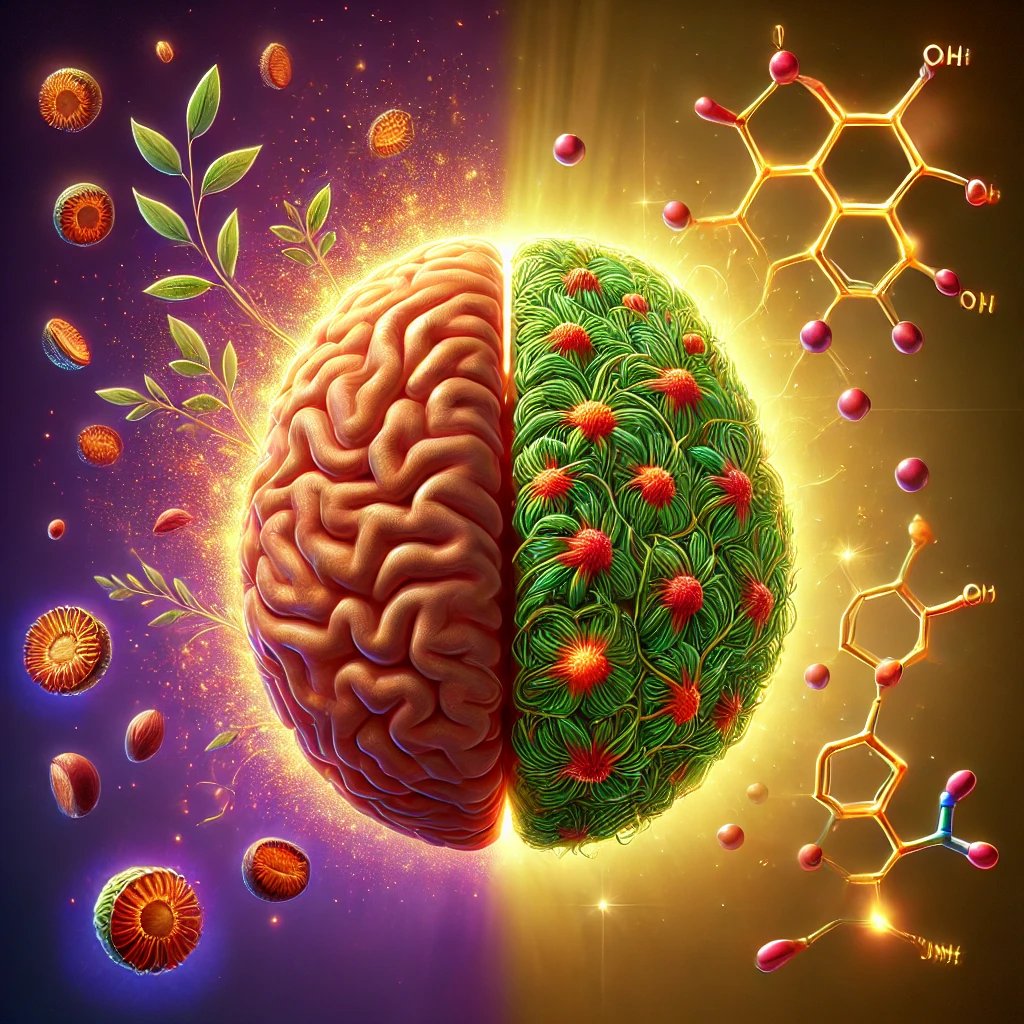Vitamin E Isoforms & GG for Cognitive Health
Explore how nature's vitamin E isoforms and geranylgeraniol (GG) support cognitive health and may offer promise for Alzheimer's prevention and therapy. Discover the science behind their protective roles against oxidative stress and neuroinflammation.
ANTI-AGEINGLONGEVITYMETABOLIC HEALTHBRAIN HEALTHINFLAMMATIONCELLULAR HEALTH
AlexanderJ
4/22/20254 min read


1. Oxidative Stress & Alzheimer’s Disease - A Redox Imbalance
Key finding: In a serum study of 53 healthy controls, 35 mild cognitive impairment (MCI) and 48 AD patients, antioxidant capacity (measured by MTT reduction) was significantly lower in MCI and AD versus controls, despite no change in lipid peroxidation (TBARS)
Interpretation: Early cognitive decline appears driven more by a weakened antioxidant defense than by excess reactive oxygen species (ROS) generation.
Implication: Restoring systemic antioxidant capacity may slow or prevent progression from MCI to AD. IJHSR
2. Annatto Tocotrienols - “Next‑Generation” Vitamin E
What Are They?
Tocotrienols are one of eight Vitamin E isoforms (four tocopherols + four tocotrienols).
Annatto seed is unique in providing a tocotrienol‑rich fraction (≈ 90–95% δ‑ and γ‑tocotrienol) without tocopherols.
Neuroprotective Mechanisms
Potent Free‑Radical Scavengers
Quench lipid‑peroxyl radicals, protecting membranes and mitochondria Frontiers.
Mevalonate Pathway Modulation
Inhibit HMG‑CoA reductase, reducing inflammatory prenylated intermediates that drive neurodegeneration Frontiers.
Anti‑Inflammatory Actions
Downregulate NF‑κB and cytokine production in microglia, dampening chronic neuroinflammation BioMed Central.
Mitochondrial Protection & Biogenesis
Preserve ATP production, inhibit apoptosis, and support synaptic function.
Evidence in Alzheimer’s Context
Preclinical / In Vitro: Tocotrienols prevent glutamate‑induced neuronal death at nanomolar concentrations, outperforming α‑tocopherol
Animal Models: Dietary tocotrienols reduce amyloid‑β accumulation, improve memory, and decrease oxidative markers in AD transgenic mice ScienceDirect
Human Data: Although large RCTs are pending, dietary patterns high in tocotrienols correlate with slower cognitive decline.
Practical Application
Supplement Form: Annatto‑derived tocotrienol‑rich fraction (δ + γ‑T3 ≥ 90%) i.e. Eannatto 300
Typical Dose: 200–300 mg/day, taken with your main meal containing fat for optimal absorption.
Biomarker Monitoring:
MTT assay for serum antioxidant capacity every 3–6 months.
HPLC to confirm plasma tocotrienol levels.
3. Annatto Geranylgeraniol (GG) -A Mitochondrial & Mevalonate Ally
What Is GG?
Geranylgeraniol (GG) is a 20‑carbon isoprenoid alcohol synthesized via the mevalonate pathway and found in annatto seeds.
Roles in Health: Precursor for Coenzyme Q10, menaquinone‑4 (Vitamin K2), and protein prenylation—processes vital for cellular energy, antioxidant defense, and signal transduction.
Neuroprotective Rationale
Support for Mitochondrial Function
Enhances CoQ10 synthesis, boosting electron transport and ATP production—key for high‑energy neurons
Redox Homeostasis
Indirectly amplifies antioxidant enzyme activities by maintaining mitochondrial health.
Anti‑Inflammatory Potential
GG can mitigate statin‑induced mitochondrial stress and lower inflammatory markers MDPI.
Evidence & Application
Clinical Safety: An 8‑week, dose‑escalation trial (150→300 mg/day) in healthy adults showed GG is well tolerated, with no adverse hematologic or hormonal effects
Neurodegenerative Focus: Direct trials in AD are lacking, but GG’s mitochondrial support and mevalonate modulation mirror pathways disrupted in AD.
Supplement Form: Annatto‑sourced GG-Essential (i.e. GG‑Gold™) at 150–300 mg/day, ideally alongside tocotrienols to synergize mevalonate pathway effects.
4. Integrating Tocotrienol & GG for Cognitive Health
Tocotrienols
Daily Dose: 200–300 mg/day
Mechanism: T3-RFAntioxidant, anti‑inflammatory, mevalonate inhibition, mitochondrial protection
Geranylgeraniol
Daily Dose: 150–300 mg/day
Mechanism: GGCoQ10 & vitamin K2 precursor, mitochondrial support, redox maintenance
Combination of Both
Daily Dose: 1 capsule Eannatto 150+ twice a day - breakfast & dinner provides 300 mg/day of tocotrienol and 150mg of geranylgeraniol. For higher doses take Eannatto 300 plus GG-Essential
Combination Rationale: Co‑supplementation targets both oxidative and metabolic dysregulation—two hallmarks of MCI/AD.
Lifestyle Synergy: Adopt a Mediterranean‑style diet rich in polyphenols, engage in regular aerobic exercise and cognitive training to maximize benefits.
5. Looking Ahead - Clinical Research Needs
Randomized Controlled Trials in MCI/early AD to assess:
Cognitive outcomes (e.g. ADAS‑Cog, MMSE)
Biomarkers (serum MTT, tocotrienol/GG levels, neuroimaging)
Safety in older adults, especially those on anticoagulants or statins.
Personalized Approaches: Explore efficacy in APOE ε4 carriers versus non‑carriers.
Long‑Term Follow‑Up: Determine whether early supplementation delays onset or slows progression of dementia.
References & Further Reading
Lee J, Kwon HJ, Lee BC et al. A Review on the Relationship between Tocotrienol and Alzheimer’s Disease. Nutrients. 2018;10(7):881.
▶︎ https://doi.org/10.3390/nu10070881Naomi R, Shafie NH, Kaniappan P, Bahari H. An Interactive Review on the Role of Tocotrienols in the Neurodegenerative Disorders. Front Nutr. 2021;8:754086.
▶︎ https://www.frontiersin.org/articles/10.3389/fnut.2021.754086/fullGupta A, Prabhakar I, Sharma S. Potential of tocotrienols in the prevention and therapy of Alzheimer’s disease. Neurochem Int. 2015;89:100–114.
▶︎ https://www.sciencedirect.com/science/article/pii/S0955286315003046Basu S, Rajendran G. Anti‑inflammatory Activity of Tocotrienols in Age‑related Pathologies. Biol Proced Online. 2018;20:11.
▶︎ https://biologicalproceduresonline.biomedcentral.com/articles/10.1186/s12575-018-0087-4Designs for Health. Annatto GG Patient Education Sheet.
▶︎ https://www.designsforhealth.com/api/library-assets/patient-education---annatto-gg-150-patient-ed-sheetFaria MC, Gonçalves GS, Duarte RCF et al. Antioxidant capacity is decreased in Alzheimer’s disease and mild cognitive impairment patients. Int J Health Sci Res. 2019;9(4):178–186.
https://www.ijhsr.org/IJHSR_Vol.9_Issue.4_April2019/26.pdf
Disclaimer: This blog post is for informational purposes only and does not constitute medical advice. Consult your healthcare provider before starting any new supplement regimen.
The Best Time to Prevent Disease Is Before It Begins
Taking charge of your health today can profoundly impact your well-being tomorrow. By embracing preventive strategies and informed lifestyle choices, you empower yourself to reduce the risk of chronic diseases and enhance your quality of life.
Explore Further:
Visit Our Health Store: Discover a curated selection of supplements and wellness products designed to support your preventive health journey.
Subscribe to Our Newsletter: Stay informed with the latest research, health tips, and exclusive offers by subscribing to our newsletter. Access our newsletter archive for a wealth of information to guide your wellness path.
Empower yourself with knowledge and proactive choices, your future self will thank you.
